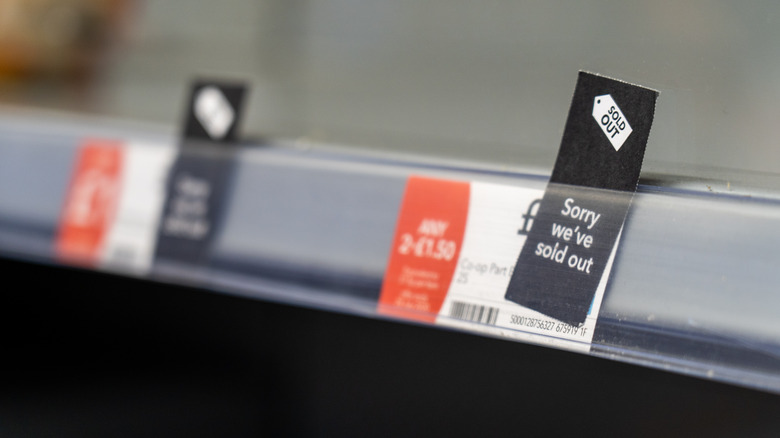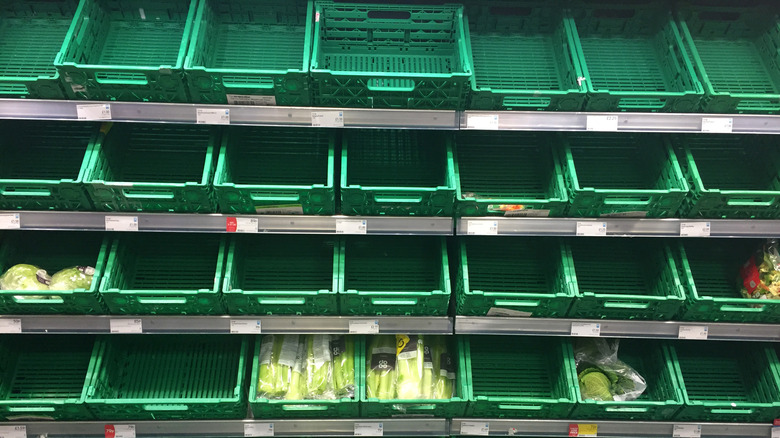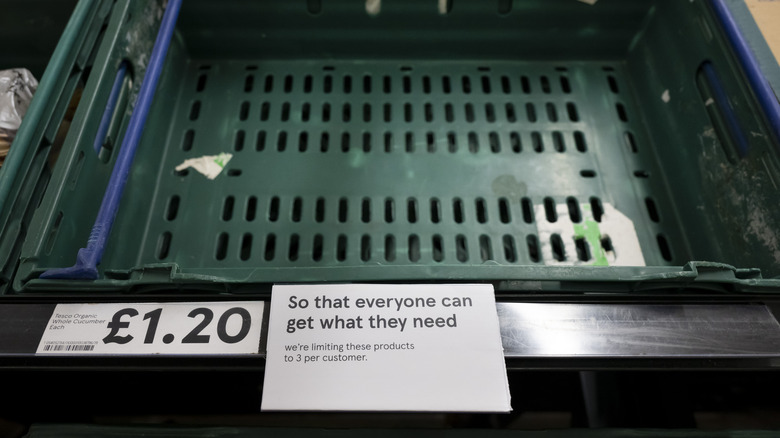UK Food Shortages Throw Future Of British Fruit Orchards In Jeopardy
Britons may need to ration their apples and pears. The United Kingdom has been struggling with multiple fruit and vegetable shortages brought on by a perfect storm of obstacles (although "perfect" hardly seems like an appropriate word in this scenario). The factors of climate change, international relations, and labor conflicts have come together all at once to cripple the British produce market, and while Members of Parliament have offered tentative timeframes for recovery, there is no firm end in sight.
The issues begin with the weather, as has been the case for other food shortages. Britain's temperate climate has traditionally been a benefit to crops, but the island nation entered a drought in the summer of 2022 that has made much of its soil inhospitable. Meanwhile, cold conditions in Spain and Morocco, two key exporters to the U.K., have taken a terrible toll on staple fruits and vegetables such as peppers and tomatoes.
In other parts of Europe, it's gotten so cold that even greenhouses aren't viable. British and Dutch farmers, who typically grow lettuce in greenhouses during winter, have had to shut down operations because they can't afford to meet their heating needs.
Brexit has backfired on the UK's food supply
The United Kingdom's exit from the European Union is looking worse and worse in hindsight, as the full range of its implications manifest themselves. It's now more expensive and bureaucratically complex for other European nations to export their produce across the English Channel. Many exporters are prioritizing their fellow EU members and pushing Britons to the back of the line in the competition for their scarce resources. That's not all. Justin King, former chief executive at Britain's largest grocery chain, Sainsbury's, told the Evening Standard that Brexit has shrunken the U.K.'s labor pool. The U.K.'s government, meanwhile, has pinned the blame on weather and made no connections to Brexit.
The U.K.'s domestic labor pool is dwindling as well, as British farmers have reportedly planted just one-third of the trees they need to maintain normal production levels. Growers say they've been forced to cut back due to insufficient returns from grocery stores. The rising costs of energy, labor, packing, and shipping have led to a 23% increase in farm expenses, compared to a 1% interest in returns. Many growers have decided to abandon their profession entirely, digging up their orchards, in search of a more profitable career.
This won't just affect the country's food supply, either. Orchards are important anchors of biodiversity, and many more species may suffer as farmland is lost.
Grocery stores are rationing produce
As far as a solution to the U.K.'s produce shortage goes, it seems little can be done, at least in the short term. And nobody seems to agree on how long the shortage will last.
George Eustice, former U.K. Secretary of State for Environment, Food, and Rural Affairs, told the BBC in February that he expected the shortage to end in "three to four weeks." However, a representative of the Lea Valley Growers Association, one of the U.K.'s largest consortiums of farmers, told CNN that many crops will remain in short supply until May. In the meantime, grocery stores are being forced to take drastic measures.
Many of the U.K.'s most prominent grocers are now rationing produce. Tesco, Britain's largest supermarket chain, has imposed a three item limit on cucumbers, tomatoes, and peppers, while Morrisons has a two item limit in place that also extends to lettuce. Even international chains such as Aldi have been forced to establish restrictions. Even crops that haven't suffered as much environmental damage have been impacted by the produce squeeze. Urging her nation to end its dependence on imported produce, environment minister Thérèse Coffey suggested Britons eat locally-grown turnips in place of tomatoes. The next day, Tesco sold out of turnips.


